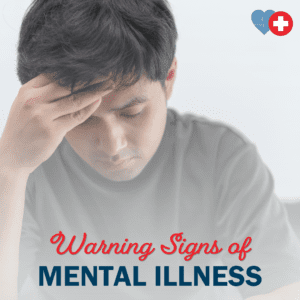Common Warning Signs of Mental Illness
 For those who struggle with mental illness, it’s easy to feel alone and misunderstood. However, it’s estimated that 1 in 5 U.S. adults will experience mental illness each year, as well as 1 in 6 American youth between ages 6 and 17. And just like the vast majority of medical conditions, mental illness does not simply appear out of the blue. In fact, the National Alliance on Mental Illness reports that approximately 50% of all lifetime mental illness begins by age 14, with 75% of cases beginning by age 24.
For those who struggle with mental illness, it’s easy to feel alone and misunderstood. However, it’s estimated that 1 in 5 U.S. adults will experience mental illness each year, as well as 1 in 6 American youth between ages 6 and 17. And just like the vast majority of medical conditions, mental illness does not simply appear out of the blue. In fact, the National Alliance on Mental Illness reports that approximately 50% of all lifetime mental illness begins by age 14, with 75% of cases beginning by age 24.
Whether it’s bipolar disorder, schizophrenia or depression, mental illness develops over time and there are a number of common warning signs that can be flagged if paid attention to. Early intervention is key to reducing the severity of symptoms and treating the mental illness, which is why it’s essential to learn about the early warning signs of mental illness in order to properly help a loved one, friend or co-worker who may be suffering from a mental health condition.
Warning signs
The following are some of the most commonly reported early symptoms or warning signs of mental illness.
- Dramatic shifts in mood such as depressed feelings or irritability.
- Changes in appetite, such as overeating or not eating enough.
- Lack of interest in social activity, work, school or extracurriculars.
- Increased feelings of nervousness or anxiety.
- Problems concentrating or thinking, whether in school, at work or even in everyday tasks.
- Heightened sensory sensitivity to sounds, smells or touch.
- Increased amounts of time spent isolating from friends and family.
- Unusual behavior or ways of thinking.
- Feeling disconnected from reality.
- Changes in sleep habits, such as sleeping more than usual or sleeping too little.
- Loss of initiative or motivation to do things such as work, study, maintain personal hygiene, etc.
When to take action
If someone you know has one of these symptoms, it doesn’t necessarily mean they are experiencing a form of mental illness. However, if you or someone close to you is experiencing a number of the warning signs simultaneously and the symptoms are affecting their ability to work, study or live their normal life, seek an evaluation from a physician or a mental health professional.
In the case that you or someone you know is experiencing suicidal thoughts or urges, get professional help immediately at the nearest medical facility or call the National Suicide Prevention Lifeline at 800.273.8255.




